By Pradip Kumar Dutta
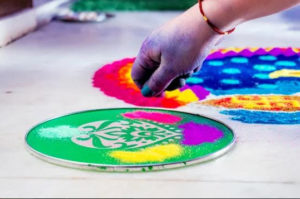 Diwali or Deepavali is one of the most popular Hindu festivals, perhaps the most celebrated one in North and South India. It is the festival of lights signifying victory of light over darkness,literacy over ignorance, truth over lies, good over evil, progress over backwardness. In India, it is observed by offering a special puja, scintillating illumination, new clothes, delicacies and sweetmeats. In Bengal, locals observe
Diwali or Deepavali is one of the most popular Hindu festivals, perhaps the most celebrated one in North and South India. It is the festival of lights signifying victory of light over darkness,literacy over ignorance, truth over lies, good over evil, progress over backwardness. In India, it is observed by offering a special puja, scintillating illumination, new clothes, delicacies and sweetmeats. In Bengal, locals observe 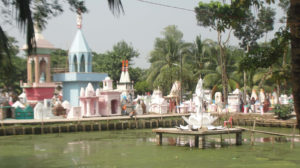 the day similarly but with lesser fervour since their biggest festivities is during Durga Puja. On the day of Diwali, Shyamapuja is marked by offering obeisance to Goddess Kali, followed by grandiose in the offerings to the Goddess on Amavasya day which is the darkest day of the month Kartika of the Hindu calendar. The day prior to that is called Bhoot-Chaturdashi. Marking the celebrations, unique happenings in some parts of our country, Bangladesh is brought to the
the day similarly but with lesser fervour since their biggest festivities is during Durga Puja. On the day of Diwali, Shyamapuja is marked by offering obeisance to Goddess Kali, followed by grandiose in the offerings to the Goddess on Amavasya day which is the darkest day of the month Kartika of the Hindu calendar. The day prior to that is called Bhoot-Chaturdashi. Marking the celebrations, unique happenings in some parts of our country, Bangladesh is brought to the 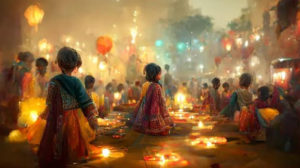 fore.
fore.According to Hindu scriptures, it is believed that departed souls of predecessors return to earth in their bhoot (unseen airy soul) forms to visit their descendants, to seek their whereabouts/well-being and to bless them. The descendents, in return, clean their tombstones befittingly, decorate them and illuminate  them hugely to show the way to the souls in the Amavasya darkness. Ample food of their predecessor’s choice, water, sweetmeat and drinks are offered for their satisfaction in front of all tombstones. Family members visit the cremation grounds of their predecessors and other deceased ones of the family on this occasion. This custom is particularly prevalent on a huge scale in the South Western part of Bangladesh’s
them hugely to show the way to the souls in the Amavasya darkness. Ample food of their predecessor’s choice, water, sweetmeat and drinks are offered for their satisfaction in front of all tombstones. Family members visit the cremation grounds of their predecessors and other deceased ones of the family on this occasion. This custom is particularly prevalent on a huge scale in the South Western part of Bangladesh’s  Barishal area . This observation is known as Shwashan Deepavali or commonly called Shoshan Dipali with the biggest event taking place in Barishal Kaunia Mohashwashan. It encompasses an area of about 5 acres and is said to accommodate about 50000 Mauths or tombstones, most being eye-catchy whereas others, toned down. Many may have disappeared in time since their descendents may have left for safer or better living elsewhere. On this day the whole area and surrounding ones, wear a festive look
Barishal area . This observation is known as Shwashan Deepavali or commonly called Shoshan Dipali with the biggest event taking place in Barishal Kaunia Mohashwashan. It encompasses an area of about 5 acres and is said to accommodate about 50000 Mauths or tombstones, most being eye-catchy whereas others, toned down. Many may have disappeared in time since their descendents may have left for safer or better living elsewhere. On this day the whole area and surrounding ones, wear a festive look  marking the happening. It is estimated that hundreds of thousand people belonging to different stratas of the society visit the place on this Shoshan Dipali day in respect of the departed souls, to seek their blessings, and to show solidarity to the occasion or simply to partake in the festivities. A big Mela is also organised, simultaneously. The law enforcers face a tough time to manage such a big gathering of people and maintain discipline. A big contingent of volunteers are arranged by the Managing Committee of the event to assist the law enforcing agents. Usually no untoward happenings are reported. On the same day all cremation grounds of the country have similar such affairs but to a lesser degree. The grand Kaunia Shwashan deepavali is observed at the same location reportedly from 1927 when the cremation ground moved there from Notun bazar. In the previous location it started about 200 years ago,initiated by the local zamindars. Among noted personalities, the great poet Jibanananda Das’s father and grandfather were cremated in Kaunia. Even though Mahatma Aswini Dutta was cremated at Calcutta, his ashes were brought and a tombstone was built here.
marking the happening. It is estimated that hundreds of thousand people belonging to different stratas of the society visit the place on this Shoshan Dipali day in respect of the departed souls, to seek their blessings, and to show solidarity to the occasion or simply to partake in the festivities. A big Mela is also organised, simultaneously. The law enforcers face a tough time to manage such a big gathering of people and maintain discipline. A big contingent of volunteers are arranged by the Managing Committee of the event to assist the law enforcing agents. Usually no untoward happenings are reported. On the same day all cremation grounds of the country have similar such affairs but to a lesser degree. The grand Kaunia Shwashan deepavali is observed at the same location reportedly from 1927 when the cremation ground moved there from Notun bazar. In the previous location it started about 200 years ago,initiated by the local zamindars. Among noted personalities, the great poet Jibanananda Das’s father and grandfather were cremated in Kaunia. Even though Mahatma Aswini Dutta was cremated at Calcutta, his ashes were brought and a tombstone was built here.
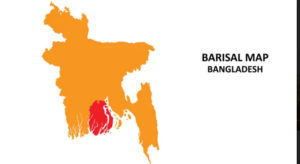 them hugely to show the way to the souls in the Amavasya darkness. Ample food of their predecessor’s choice, water, sweetmeat and drinks are offered for their satisfaction in front of all tombstones. Family members visit the cremation grounds of their predecessors and other deceased ones of the family on this occasion. This custom is particularly prevalent on a huge scale in the South Western part of Bangladesh’s
them hugely to show the way to the souls in the Amavasya darkness. Ample food of their predecessor’s choice, water, sweetmeat and drinks are offered for their satisfaction in front of all tombstones. Family members visit the cremation grounds of their predecessors and other deceased ones of the family on this occasion. This custom is particularly prevalent on a huge scale in the South Western part of Bangladesh’s 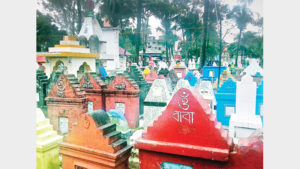 Barishal area . This observation is known as Shwashan Deepavali or commonly called Shoshan Dipali with the biggest event taking place in Barishal Kaunia Mohashwashan. It encompasses an area of about 5 acres and is said to accommodate about 50000 Mauths or tombstones, most being eye-catchy whereas others, toned down. Many may have disappeared in time since their descendents may have left for safer or better living elsewhere. On this day the whole area and surrounding ones, wear a festive look
Barishal area . This observation is known as Shwashan Deepavali or commonly called Shoshan Dipali with the biggest event taking place in Barishal Kaunia Mohashwashan. It encompasses an area of about 5 acres and is said to accommodate about 50000 Mauths or tombstones, most being eye-catchy whereas others, toned down. Many may have disappeared in time since their descendents may have left for safer or better living elsewhere. On this day the whole area and surrounding ones, wear a festive look 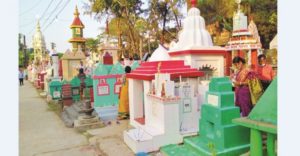 marking the happening. It is estimated that hundreds of thousand people belonging to different stratas of the society visit the place on this Shoshan Dipali day in respect of the departed souls, to seek their blessings, and to show solidarity to the occasion or simply to partake in the festivities. A big Mela is also organised, simultaneously. The law enforcers face a tough time to manage such a big gathering of people and maintain discipline. A big contingent of volunteers are arranged by the Managing Committee of the event to assist the law enforcing agents. Usually no untoward happenings are reported. On the same day all cremation grounds of the country have similar such affairs but to a lesser degree. The grand Kaunia Shwashan deepavali is observed at the same location reportedly from 1927 when the cremation ground moved there from Notun bazar. In the previous location it started about 200 years ago,initiated by the local zamindars. Among noted personalities, the great poet Jibanananda Das’s father and grandfather were cremated in Kaunia. Even though Mahatma Aswini Dutta was cremated at Calcutta, his ashes were brought and a tombstone was built here.
marking the happening. It is estimated that hundreds of thousand people belonging to different stratas of the society visit the place on this Shoshan Dipali day in respect of the departed souls, to seek their blessings, and to show solidarity to the occasion or simply to partake in the festivities. A big Mela is also organised, simultaneously. The law enforcers face a tough time to manage such a big gathering of people and maintain discipline. A big contingent of volunteers are arranged by the Managing Committee of the event to assist the law enforcing agents. Usually no untoward happenings are reported. On the same day all cremation grounds of the country have similar such affairs but to a lesser degree. The grand Kaunia Shwashan deepavali is observed at the same location reportedly from 1927 when the cremation ground moved there from Notun bazar. In the previous location it started about 200 years ago,initiated by the local zamindars. Among noted personalities, the great poet Jibanananda Das’s father and grandfather were cremated in Kaunia. Even though Mahatma Aswini Dutta was cremated at Calcutta, his ashes were brought and a tombstone was built here.Shashan Deepali is an event to reckon with in Barishal.



